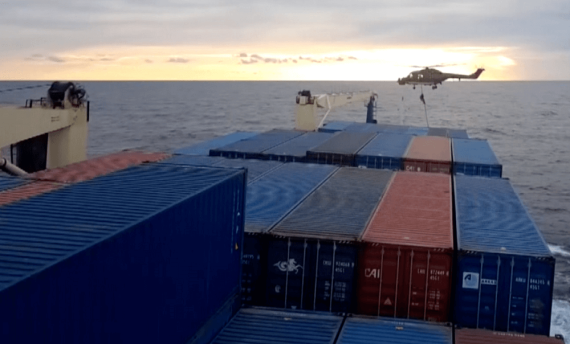On June 22, 2020, participating in Operation Irini, the German frigate Hamburg searched the Turkish merchant ship MV Roseline A. It was subsequently stated that the soldiers who boarded the ship questioned the crew and conducted detailed examinations of the ship by opening the freight containers.
The Republic of Turkey Ministry of Foreign Affairs immediately condemned the EU move in an official statement by declaring that no advance permission had been acquired either from the captain or from Turkey.
The ministry pointed out that information concerning the EU move was conveyed to Turkey exclusively through the ship’s staff. This rare incident that led to a formal objection from Turkey and caused serious tension deserves to be examined as it raises significant political and legal issues.
The Legal Framework of Intervention on the High Seas
The rules regulating the operation of merchant ships on the high seas are established by the 1982 UN Convention on the Law of the Sea (hereinafter, Law of the Sea Convention). Although Turkey is not a party to the convention, the relevant rules reflect customary principles of international law and are abided by Turkey and all other states.
The doctrine of the high seas is based on the principle of the freedom of the seas. Therein, all states can enjoy the freedom of navigation of the high seas and the right of their aircraft to fly in the airspace over the high seas, to place submarine cables and oil pipelines, to fish, conduct scientific research, and construct artificial islands and other facilities permitted by international law.
Another fundamental principle that dominates the legal status of the high seas is that all ships on the high seas (civilian or military, private or state-owned) are subject to the legislative, executive, and adjudicative jurisdiction of the flag state. No other state can exercise jurisdiction over these ships. This rule covers the ship, the cargo, and the personnel on board.
However, according to the Law of the Sea Convention, if there are reasonable grounds for suspecting that a merchant ship is involved in piracy, slave trade, unauthorized radio broadcasting, or travel with no nationality or false nationality, warships or security ships of any state can interfere against that ship.
This is called the “right to visit” and it refers to stopping the ship, getting aboard with sufficient military personnel, and inspecting it.
Apart from these general rules, there is a special situation with respect to the ships traveling to or from Libya. The UN Security Council took various decisions to support the efforts towards ending the internal conflict in Libya.
All decisions – namely 1970 (2011), 1973 (2011), 2009 (2011), 2095 (2013), 2174 (2014), and 2292 (2016) – brought measures, some of which banned transfer of arms from or to Libya with a few exceptions.
Decision 2292 (2016) confers on all states to inspect the vessels on the high seas that are believed to be carrying arms to or from Libya in violation of the arms embargo.
There was also a further move in the above context from the European Union. Due to the recent developments both in the Mediterranean Sea and in Libya, the EU adopted a revised “Common Security and Defense Policy” (CSDP) in order to “ensure the effective implementation” of the Libyan arms embargo.
Accordingly, the EU established the Irini Operation Force under the EUNAVFOR MED on March 31, 2020 in order “to implement the UN’s Arms Embargo on Libya by using air, satellite and sea elements.” The task of this operation was, in fact, defined much more broadly so as to comprise the prevention of oil smuggling from Libya, the training of the Libyan Coast Guard Forces, and the prevention of human trafficking.
The Legal and Political Reflections
Considering the legal framework summarized above, the first issue that needs to be addressed is whether there were “reasonable grounds for suspecting” the Turkish merchant ship was involved in any activities banned in the Law of the Sea Convention.
The intervention is described in the official statement of the Republic of Turkey Ministry of Foreign Affairs as “ambiguous” and “suspicious.” This implies that Turkey was not presented with satisfactory evidence that there were reasonable grounds to intervene.
Moreover, the fact that no weapon was found as a result of the search shows that the ship was searched based on a general suspicion rather than concrete one.
No weapon was found as a result of the search shows that the ship was searched based on a general suspicion rather than concrete one.
It was pointed out in the statement made by the ministry that the purpose and benefit of Operation Irini “are open to debate” and that the operation itself was not “impartial” as it did not control “the arms support to the outlawed Haftar” but instead it “punished the legitimate Libyan Government.”
The statement points out that neither NATO nor the governments of Turkey and Libya were consulted, and that the consent of the flag state, i.e. Turkey, was not obtained.
It is without doubt that there are controversial matters surrounding Operation Irini. First, the operation was not directly established by a UN Security Council resolution nor was there any UN supervision. In fact, the EU launched the operation with objectives that do not comply with the task of inspecting the arms embargo.
Considering that the task of Operation Irini is not limited to searching for weapons but also covers the prevention of oil smuggling and human trafficking, it becomes clear that it is, in fact, actually associated with the protection of the security and defense interests of the EU in the Mediterranean Sea.
Recommended
The command council of the operation is dominated by France and Greece which are recently in serious conflict with Turkey in the Mediterranean Sea and Libya. The deputy operation commander is a French national and Italy and Greece will alternate the Force Commander every six months.
Therefore, the activities carried out under Operation Irini are inevitably partial against Turkey and lacking goodwill, which makes any activity illegitimate according to the fundamental principle of international law.
As can be understood from the UN Security Council resolutions mentioned above, it is not clear whether the arms embargo also targets the legitimate government of Libya. In some decisions, the legitimate government is held exempt from restrictions in order to ensure stability in the country.
The Libyan Government of National Accord has established defense agreements with certain countries, including Turkey. The arms embargo should therefore not prevent the arrival of armed elements from countries like Turkey given the signed bilateral defense cooperation agreements between the two countries.
Turkey’s Response
Following the search of the Turkish ship, Turkey’s priority is to prevent similar interventions on Turkish merchant vessels in the Mediterranean Sea. This said, there are legal measures against such unlawful interventions.
As the ships on high seas are under the jurisdiction of the flag state and are considered a part of that country, the flag state has the right to take all necessary legitimate measures to prevent such illegitimate acts on the basis of the right of self-defense.
These measures may include military measures as long as they are necessary and proportionate.
On the other hand, the flag state has the right to initiate the necessary legal procedures in the courts of the intervening state in order to get compensation for all damages that resulted from an illegal intervention.
The Law of the Sea Convention provides that all the damages should be compensated “if the suspicions prove to be unfounded.”
A criminal procedure against the personnel who intervened can also be initiated, if there is enough evidence that the intervention and the related acts constituted criminal violations.
The acts during the intervention were conducted on a Turkish-flagged merchant ship that is regarded as Turkish territory. The personnel who carried out the acts could therefore be subject to a criminal investigation in the Turkish courts in accordance with the relevant provisions of the Turkish Criminal Code.

VIDEO: Mercenaries Reborn: How Private Armies Violate Human Rights






